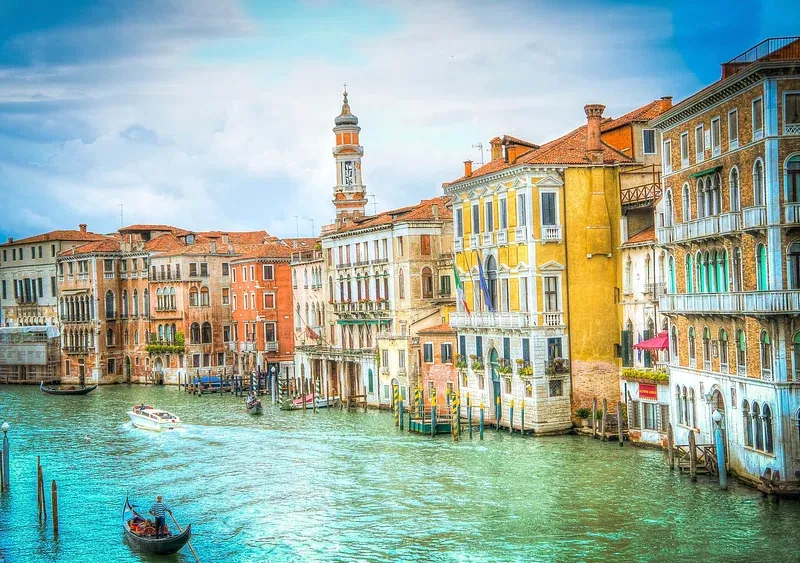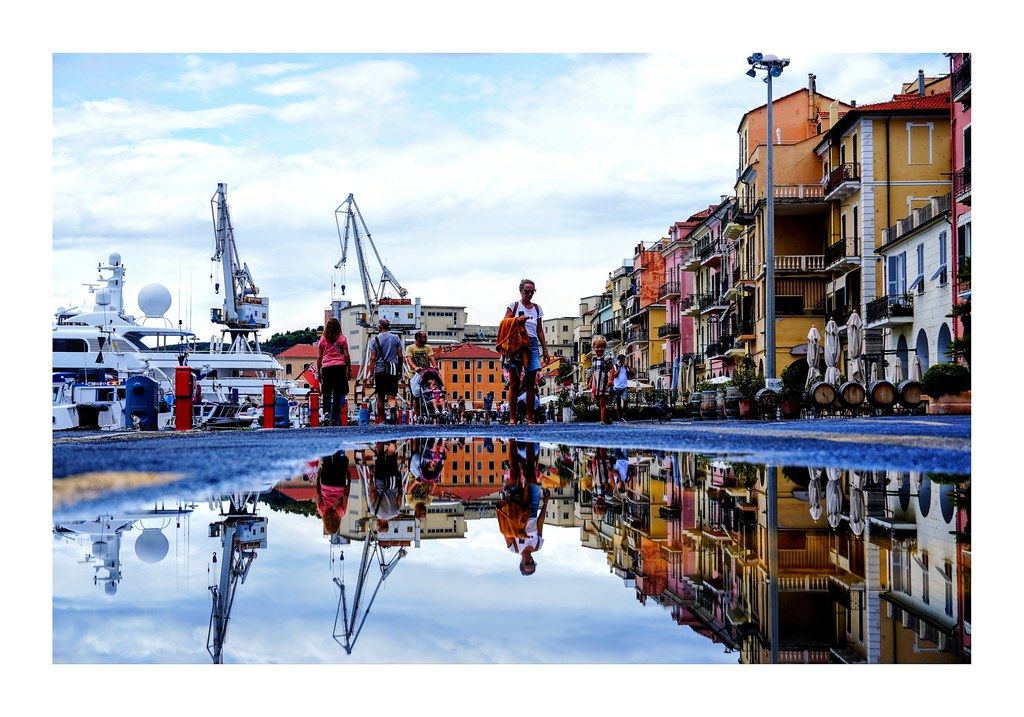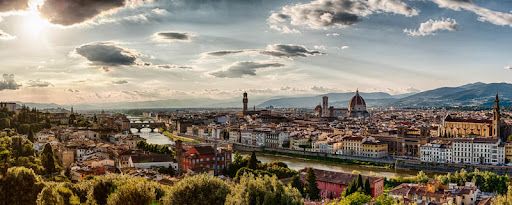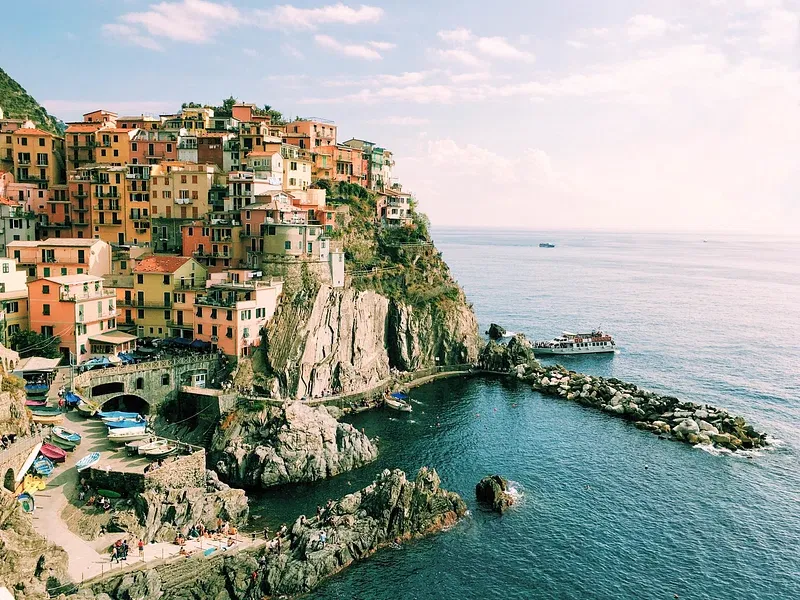CHAT
WITH US
WITH US
GET A
QUOTE
have questions? call us
+44 3330 907053

Moving Guides • Europe • 07 Aug 2024
Share this article
Dreaming of "la dolce vita" in Italy? The UK's exit from the EU might have changed some rules, but moving to Italy from the UK is still a captivating adventure. From savouring delicious cuisine to immersing yourself in rich history and culture, Italy offers an alluring lifestyle. However, post-Brexit changes require careful navigation of visa and residency requirements.
This guide is here to help you through the process, ensuring your move is as smooth as possible. We'll delve into the essential details of residency permits, visa options, and even financial tips for managing your money while abroad.
Let's explore everything you need to know to make your Italian dream a reality.
Moving to Italy is a big step, especially for Brits after Brexit. You need to figure out the visa process. There are different visas, each with its own requirements.
UK citizens now need a visa for long stays in Italy. These are some common visa types:
When applying for an Italian visa, you need to gather some documents:
Most visas need to be applied for at the Italian Consulates in London, Manchester, or Edinburgh. It can take 3 weeks to 3 months to process. Always keep your ID with you. Let local police know if you host non-EU visitors.
After you arrive in Italy, there are some things you must do:
Don't forget, under the Withdrawal Agreement, the 'carta di soggiorno' will cost you 30.46 EUR. Family members can join and live in Italy any time.

If you're a UK national wanting to live in Italy, watch the residency rules. Since Brexit, the kinds of permits you might need have changed. This depends on how long you're staying and why.
If you plan to stay in Italy for over 90 days, you need a temporary residency. Apply within eight days after you arrive. This permit's length depends on your reason for being there, like studying, working, or joining family.
If you can stay in Italy for five years without breaks, you might get permanent residency. To qualify, you need to follow certain rules, like no criminal record. You must also pass an A2 level Italian language test.
Getting an Italian residency permit means having the right doc's. You need to show:
The total cost for an Italian residency permit is about €76,46. Renewing it costs at least €80.
To apply, go to the questura (police station). UK citizens must get a visa from Italy's consulate before they leave. You need to apply for a permit within eight days if you're not from the EU. If you lived in Italy before January 1, 2021, you might get a 'carta di soggiorno' thanks to the Withdrawal Agreement.
Here's a quick look at how living costs in Italy and the UK compare:
| Item | Italy | UK |
|---|---|---|
| Meal (restaurant) | €15 | €18 |
| Bread (1 loaf) | €1.50 | €1.90 |
| Beer (0.5L) | €1.20 | €1.80 |
| Public Transport (monthly pass) | €35 | €65 |
| Utilities (monthly) | €145 | €185 |
These numbers show Italy's living costs are generally lower than the UK's. This info can help you plan your budget as you move to Italy.

For Britons moving to Italy, it's key to know about the healthcare system. You must choose between the public system, Servizio Sanitario Nazionale (SSN), and private health insurance. This choice is crucial for expats.
The SSN is Italy's public health service, serving all residents. If you work or own a business in Italy, you have to sign up. Those without jobs can also get healthcare by paying yearly. Services like emergency help, hospital visits, and seeing a GP are free when you're registered. But, you might have to pay a bit for seeing specialists or having tests, except if you qualify for free.
Private health insurance is another option for those not using the SSN or wanting extra coverage. It often gives better services and comfort. British people moving to Italy might prefer this to avoid waiting for care and to get more personalized plans.
To register with the SSN, visit your nearest Azienda Sanitaria Locale (ASL) with these documents:
Joining the SSN is free for most people who work or get a pension. For others, there might be a fee. If you have family with you, they also need a special permit called 'carta di soggiorno'. It costs 30.46 EUR and must be done within 90 days of arriving.
| Service | Cost (if applicable) |
|---|---|
| Emergency Care | Free |
| GP Appointments | Free after registration |
| Specialist Referrals | Co-payment unless exempt |
| Diagnostic Tests | Co-payment unless exempt |
| Private Health Insurance | Varies by provider |
Students from the UK can get a Global Health Insurance Card (GHIC) for low-cost healthcare. They might have to pay about 150 euros yearly to register for healthcare.
Learning about both the SSN and private insurance helps you choose the right healthcare. This is useful when moving to Italy.

Moving from the UK to Italy means understanding costs. Italy's cost of living is often cheaper than the UK. This is why many UK expats find it appealing. Let's look closely at daily expenses, housing options, and utilities.
In Italy, a simple lunch in the city's business area costs about €16 (£14) which is a little more than in the UK. A McDonald's combo meal costs around €10 (£8), 11% higher than in the UK. But, eating out at inexpensive places or mid-range restaurants is cheaper in Italy. You can save up to 18.7% when dining out.
Comparative Everyday Expenses:
| Expense | United Kingdom | Italy | Difference |
|---|---|---|---|
| Basic Lunchtime Menu | €17.80 (£15.00) | €16 (£14) | +2% |
| Fast-Food Combo Meal | €9.00 (£7.63) | €10 (£8) | +11% |
| Inexpensive Restaurant Meal | €17.80 (£15.00) | €15.00 (£12.64) | -15.7% |
| Mid-Range Restaurant Meal | €35.60 (£30.00) | €30.00 (£25.29) | -15.7% |
In Italy, it's cheaper to rent or buy property, especially outside big cities. For example, renting a one-bedroom flat in the city center costs €754.70 (£636.06) in Italy. In the UK, you'd pay €1,254.50 (£1,057.29), which is a big difference of -39.8%. Buying property away from the city centre in Italy is also a better deal, with prices 80.9% lower than the UK.
Living costs in Italy are also brought down by lower utility bills. For a 915 sq ft flat, you'd find utilities cost 48.8% less in Italy against the UK. This reduced expense is good news for UK expats.
Clearly, Italy has a cost-effective living environment. From dining to housing and utilities, it can save a lot for those moving from the UK.
Looking for the perfect place to stay is key when moving to Italy. You might want to rent, buy a property, or find where fellow expats live. Understanding Italy's housing market is vital.
Italy's rental market has lots to offer, from cities to the countryside. Using sites like Immobiliare, Idealista, and Italian Houses For Sale helps greatly. City centres tend to be more expensive. Yet, just outside, prices lower.
Signing a lease, which can last from one to four years, is common. You should also know and follow the contract and legal rules.
Many Italians own their homes, with owning seen as a big goal. The Italian property market is often cheaper than the UK's. This makes buying a home in Italy a good move.
Non-EU citizens, like British people, can also buy homes. Before investing, look at the location, what's around, and the chance to sell the home later.
Italy has regions that expats love. Lombardia, Lazio, where the capital is, and Toscana, with its beauty, are top picks. These areas meet expats' needs well.
Charm and a good property market make these areas ideal for settling in Italy.
| Region | Popularity | Characteristics |
|---|---|---|
| Lombardia | High | Economic Hub, Diverse Cities |
| Lazio | Medium | Political Centre, Historical Sites |
| Toscana | High | Scenic Beauty, Cultural Heritage |
| Sicilia | Medium | Mediterranean Climate, Lower Cost of Living |
Think carefully about what you need before choosing where to stay. This will help you enjoy Italy fully while dealing with all the practical stuff.

As an expatriate in Italy, managing your money is key. You need to know about the banks, how to move money, and taxes. This knowledge will help make your move easier and make sure your money is used wisely.
To get an Italian bank account, you must go to a bank in person. Bring your ID and a 'codice fiscale'. This is like a tax ID. In Italy, there are accounts for both residents and non-residents. Some international banks also help open accounts. This is very helpful for expats in Italy.
There are many ways to move money from the UK to Italy. Wise and similar services offer good rates. You can set up regular payments to make things easier. This saves you time and makes transfers more efficient.
Italy's tax system means you pay more tax as you earn more. There are national, regional, and local taxes to know about. Understanding these taxes can help you manage your money better. It can also help you find tax breaks for expats. The Italian government has info and help for understanding taxes and staying on the right side of the law.
Many British expats love living in Italy. The cost of living is 27% lower than in the UK. Wages are often higher and housing costs are much less. But, getting money matters right needs careful planning. You must understand Italy's banking and tax systems well.
Moving from the UK to Italy lets you dive into exciting job areas and different cultures. Knowing the job scene, how to get work permits, and using available tools can make job hunting easier there.
Italy has job chances in areas like tourism, cars, farming, fabrics, and metals. Lombardia and Veneto are top choices for those moving in, with strong job markets and many global firms.
Italy's tax rates (from 23% to 43%) and UK's double taxation deal make it easier for Brits. Also, dual citizenship means you can freely work and live around Italy and the EU without a visa.
Check that your job qualifications are valid in Italy before looking for work. Depending on your job, you might have to get your certificates checked. Italian accreditation can help a lot in getting a job there.
Use online job sites like Experteer and TrovoLavoro to search for jobs that fit your skills. Also, getting to know people in your field and joining expat groups can open up job opportunities.
Speaking well and knowing Italian could boost your job hunt. Even though English is often used for work, Italy prefers Italian speakers. Also, getting an Italian visa can take 3 weeks to 3 months, so start early and get your papers ready on time.

Heading to Italy from the UK may look tough, but it's doable with the right knowledge. Key steps will help you smoothly move your stuff. Understanding customs rules and picking the right removals company are crucial. Let's dive into these important points to make your move as easy as possible.
After Brexit, there are new rules for UK expats moving to Italy with their things. You can bring your household items tax-free if you've used them for over 12 months. But, you need to prove you lived where you say you did. Make sure you meet all the conditions to avoid extra charges. Also, there's a limit on how much tobacco and alcohol you can bring. Oh, and you can't bring weapons unless you get the right permission.
Choosing a top-notch removals firm, such as "Deliver1," can lessen your moving worries. They know all about Italy's customs, giving you important advice. They make sure your things get safely moved by air or sea, fitting your time and money plans. Just be sure to tell them clearly what you need and when. Good communication is key to a smooth move.
Don't forget important paperwork and the things you want to carry with you. In Italy, pets must be at least three months old and have their shots. Remember to bring along a note from your doctor if you need medicine that's more than a month's supply. If you're not taking everything at once, consider the cheap storage options. Make sure all of these details match your big plan of moving to Italy.
Italy's unique blend of history, culture, and lifestyle beckons UK citizens seeking a change of scenery. Whether it's the vibrant cities, the picturesque countryside, or the delicious cuisine, Italy offers a fulfilling experience for those willing to embrace it.
While Brexit has introduced some changes, your dream of living in Italy is still within reach. By understanding the visa requirements, navigating the financial landscape, and familiarising yourself with the local customs, you can ensure a smooth and successful transition.
Remember, moving to a new country requires careful planning and preparation. Choosing the right removals company, like Deliver1, can make all the difference in ensuring your belongings arrive safely and efficiently at your new Italian home.
Don't let the challenges deter you. With the right information and support, your move to Italy can be an exciting and enriching adventure. Start your journey today and discover the beauty, warmth, and countless opportunities that await you in this enchanting country.
Contact Deliver1 today for expert assistance with your move to Italy and make your Italian dream a reality!
A: After Brexit, you need to apply for a visa for Italy to relocate. Depending on the purpose of your stay (work, study, retirement), different visa options are available. Additionally, to reside in Italy for over 90 days, you will need to obtain an Italian residence permit.
A: No, as a UK citizen, you cannot move to Italy without a visa. Post-Brexit regulations require UK citizens to apply for the appropriate visa depending on their intentions to live, work, or study in Italy.
A: To obtain an Italian residence permit, you must first have a valid visa for Italy. After arrival, you will need to apply for residency at the local police station (Questura) and provide necessary documentation, such as proof of income, health insurance, and your accommodation details.
A: You need a work visa to legally work in Italy. You must secure a job offer from an Italian employer, who will typically assist you with the visa application process. Once in Italy, you will also need to obtain a residence permit for work purposes.
A: If you become a resident in Italy, you may be subject to tax in Italy on your worldwide income. The UK and Italy have a double taxation agreement to prevent you from being taxed twice on the same income. It is advisable to consult a tax advisor for personalised advice based on your situation.
A: Yes, you can retire in Italy as an eu citizen, but you must apply for a visa for Italy specifically for retirees. You will need to prove that you have sufficient financial means to support yourself and valid health insurance coverage throughout your stay.
A: When planning removals to Italy, be aware of customs regulations and any applicable import taxes on your belongings. It is advisable to work with a reputable international moving company like Deliver1 who are experienced in travel to Italy, ensuring a smooth transition for your personal items.
A: Yes, British citizens can buy property in Italy. There are no restrictions on foreign ownership of property, but be sure to consider the legal obligations that come with property ownership in Italy, including taxes and maintenance fees.
A: The cost of living in Italy can vary significantly depending on the location. Generally, living in smaller towns may be more affordable compared to larger cities such as Milan or Rome. It's essential to conduct a thorough comparison to determine how your budget will work in Italy.
A: Yes, you can drive in Italy using their UK driving licence for a limited period. However, if you become a resident of Italy, you will need to exchange your UK driving licence for an Italian one within a year of residency.
We love hearing from you-so please get in touch with any questions or queries.
We love hearing from you-so please get in touch with any questions or queries.
Working hours
Mon - Sat: 08:00 - 17:00
Sun: Closed
Call
+44 3330 907053Location
Unit 3, Newyears Green Lane
Newyears Green
Uxbridge
UB9 6LX
United Kingdom
